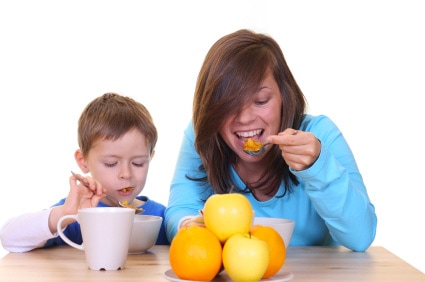
Written By: Beth Ehrensberger, RD
Title: Registered Dietitian
Alumni: University of Tennessee, Knoxville
Last Updated on:

If you pay any attention to television ads for kids’ food or scan the baby food aisle at the supermarket, you’ll immediately see that there’s a heavy emphasis on healthy foods for little people. And if you happen to have kids, you probably put forth a valiant effort to give them the best nutrition possible. But the sad fact is, while we obsess about whether a food has too much fat or too many preservatives for our kids, we’ll throw just about anything down our own hatch. Consider how you could improve the quality of your own diet by adopting a few healthy eating habits kids usually follow.

Table of Contents
There’s good reason why you should adopt the healthy eating habit of pouring yourself a glass of milk at dinner, too. Not only can dairy help build bone mass and strong teeth, but studies show that it can also cut the risk of hypertension, obesity, kidney stones, and colon cancer. Plus, because dairy contains a good amount of protein, you can help keep hunger at bay by drinking or eating milk products. On average, adult men and women need 1000 milligrams of calcium per day (older men and women need more – 1200 milligrams per day). For a very adult way to squeeze in dairy when you’re on the go, try a nonfat latte.
Babies don’t eat french fries, green beans covered in cream of mushroom soup and spinach drowning in butter – and neither should you. Prime baby foods are made from pure ingredients – simply vegetables and fruits blended with water. Why? It’s important for children to get off to a good start by learning to appreciate the unadulterated flavors of produce. If you’ve strayed from this simple mindset and only like your produce fully loaded, smothered or dipped, rehab your own healthy eating habits by going back to basics. Try fresh, local, and in-season fruits and vegetables, which taste great on their own, as well as lightly steamed or roasted.
There is a lot of emphasis on starting infants out on pure cereals. If you read the labels on baby cereals, you’ll find that there are very few – if any – additives like sugar and salt. But scan the cereal aisle of the local supermarket, and you’ll realize the shelves are crammed with adult cereals that are loaded with refined grains and sugar. Take a cue from the little ones and choose simple, whole grain cereals that are low in sugar (less than 5 grams per serving). If you find you need more flavor, add your own fruit.
Ever notice what a child does when they’re done eating? Whatever food is left on the plate goes from being an edible to a plaything. While we’re not suggesting that you squish your pasta between your fingers when you’re done, we are suggesting that when you feel full, you should stop eating – a healthy eating practice that can save you hundreds of calories per meal.
If you’re a parent yourself, there’s no doubt you’ve admonished your child for eating somewhere besides the table. It’s likely that your aim in doing so is to prevent your sofa from becoming a food drop zone, but as an adult, eating at the table can have bigger rewards than clean furniture. When you sit to eat, you’re conscious of every bite that goes into your mouth, meaning that you minimize the risk of mindless eating – like devouring a bag of chips as you munch in front of the tube.
Harness your inner kid and adopt these healthy eating habits you thought you’d outgrown. Even better, when your meal is over, make like a kid and go outside and play!
Alumni: University of Tennessee, Knoxville – Beth Sumrell Ehrensberger is a Registered Dietitian and holds a Master Degree in Public Health. An experienced nutrition counselor, writer and public speaker, Beth specializes in translating complex nutrition information into practical concepts. Beth was awarded a Nutrition Communications Fellowship to the National Cancer Institute, and has worked on the internationally recognized Nutrition Action Healthletter of the Center for Science in the Public Interest.
healthy snacks, kid's nutrition